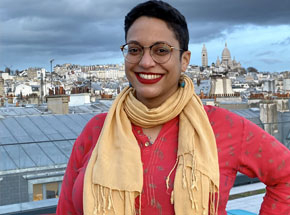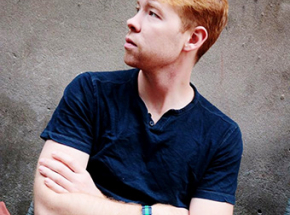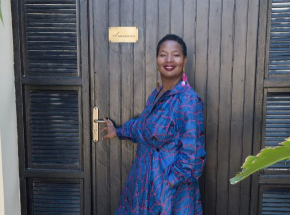- About AUP
- History of AUP
- Mission & Core Values
- Vision and Leadership
- AUP Recognition
- Alumni Success
- Campus Development
- Arts at AUP
- Policies & Guidelines
- Academics
- Undergraduate
- Graduate Programs
- MA in Diplomacy and International Law
- MA in Global Communications
- MSc in Human Rights and Data Science
- MA in International Affairs
- MA in International Affairs, Conflict Resolution, and Civil Society Development
- MSc in International Management
- MSc in Strategic Brand Management
- Find Your Thesis Advisor
- Previous Programs
- Cultural Program
- Faculty
- Summer School
- Research Centers
- The Center for Critical Democracy Studies
- The Center for Writers and Translators
- The George and Irina Schaeffer Center for the Study of Genocide, Human Rights and Conflict Prevention
- The Joy and Edward Frieman Environmental Science Center
- The Center for Media, Communication & Global Change
- Departments
- Academic Resources
- Academic Affairs
- Academic Calendar
- Academic Resource Center
- Library
- Registrar's Office
- Teaching and Learning Center
- Employer Network
- Accessibility & Accommodation Services
- Quai D'Orsay Learning Commons
- Paris as Classroom
- ACE Center
- Admissions
- Student Life
- Campus
- Student Leadership & Involvement
- Paris
- Support Services
- Student Development Help Desk
- Student Accounting Services
- Student Immigration Services
- Student Grievance Procedure
- Diversity and Inclusion
- Health & Well-being
- Digital Student Handbook
- News
- Events
- AUP Giving
- Housing Offer for 2024-2025
- Housing | Spring 2024
- IRIS Project
- IT Services
- Alumni
- About AUP
- History of AUP
- Mission & Core Values
- Vision and Leadership
- AUP Recognition
- Alumni Success
- Campus Development
- Arts at AUP
- Policies & Guidelines
- Academics
- Undergraduate
- Graduate Programs
- MA in Diplomacy and International Law
- MA in Global Communications
- MSc in Human Rights and Data Science
- MA in International Affairs
- MA in International Affairs, Conflict Resolution, and Civil Society Development
- MSc in International Management
- MSc in Strategic Brand Management
- Find Your Thesis Advisor
- Previous Programs
- Cultural Program
- Faculty
- Summer School
- Research Centers
- The Center for Critical Democracy Studies
- The Center for Writers and Translators
- The George and Irina Schaeffer Center for the Study of Genocide, Human Rights and Conflict Prevention
- The Joy and Edward Frieman Environmental Science Center
- The Center for Media, Communication & Global Change
- Departments
- Academic Resources
- Academic Affairs
- Academic Calendar
- Academic Resource Center
- Library
- Registrar's Office
- Teaching and Learning Center
- Employer Network
- Accessibility & Accommodation Services
- Quai D'Orsay Learning Commons
- Paris as Classroom
- ACE Center
- Admissions
- Student Life
- Campus
- Student Leadership & Involvement
- Paris
- Support Services
- Student Development Help Desk
- Student Accounting Services
- Student Immigration Services
- Student Grievance Procedure
- Diversity and Inclusion
- Health & Well-being
- Digital Student Handbook
- News
- Events
- AUP Giving
- Housing Offer for 2024-2025
- Housing | Spring 2024
- IRIS Project
- IT Services
- Alumni
Study Trip
This graduate study trip offers students the chance to examine the post-conflict culture in Bosnia and consider the techniques for dealing with trauma and rebuilding as a country, and individuals, after genocide. Alongside visits to museums and memorials, students met with key actors who worked to rebuild Bosnia in the wake of collective trauma. Three students set about creating a short documentary about the course and the trip, we asked Justin Kauppi to reflect on the project.
As MA in Global Communications students in Professor Waddick Doyle’s Identity Formation in a Transnational World class, Jordan Haschke, Ally Poehailos and I were set on creating a short documentary for our final project. Over the course of the semester, our class had discussed the role that identity plays around the world and how it is formed from a myriad of factors such as migration, displacement and intercultural marriage. One example of identity formation that we examined revolved around the Bosnian War, which took place from 1992 to 1995 following the breakup of Yugoslavia. The war saw many brutal armed skirmishes and sieges and affected thousands from differing religions, ethnicities, and backgrounds within the nation. Since the end of the fighting, there has been extensive documentation of first-hand accounts from those who lived through it. However, after more than 30 years of peace, much of Bosnia’s population was born after the conflict or is simply too young to remember it.
Determined to go to Bosnia, we pushed for funding for a study trip and we were given the opportunity to travel there in May. Armed only with a camera and a list of interview questions, my team and I sought to speak to young Bosnians and better understand how a war they never experienced has shaped their identity. We were fortunate enough to interview our tour guide in Sarajevo, a 26-year-old named Faris who grew up in the capital city hearing tales of the war from his family, but who believes peace will continue to prosper. Faris’ hopeful outlook on the future however contrasts sharply with the mindset of 22-year-old hotel employee Bakir. As a resident of Mostar, a religiously divided city that suffered heavy fighting, Bakir fears another conflict could break out at any moment. Our short documentary highlights these two individuals and the impact the war they never knew has had on their identities as well as on the future of their nation.
Watch their documentary below.
Related
-

Monique Callender ’18 & G’21
Alumna
Read MoreMonique Callender ’18 & G’21
Alumna
I think the most beautiful part of AUP is that it’s a safe space to be who you are.
-

Sam
Student
Read MoreSam
Student
After reading about AUP’s coursework, I knew it could help me attain my goals.
-

Dawn Booker G’13
Alumna
Read MoreDawn Booker G’13
Alumna
My experience at AUP transformed my life and career in so many ways.

